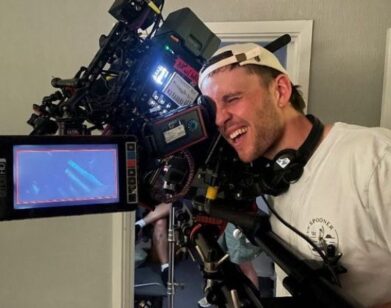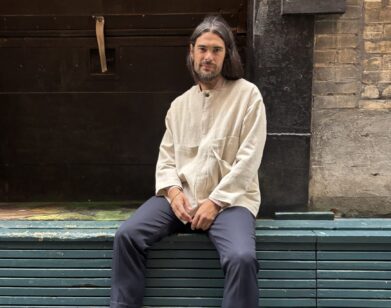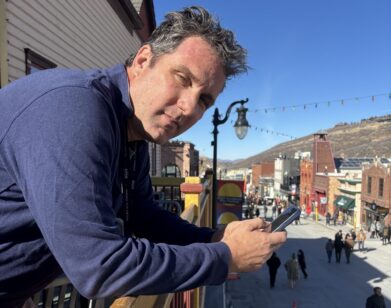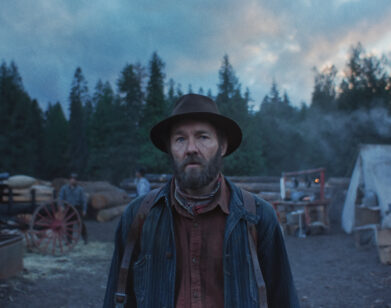Twist Ending
Rupert Grint and M. Night Shyamalan on Servant and Overcoming Anxiety
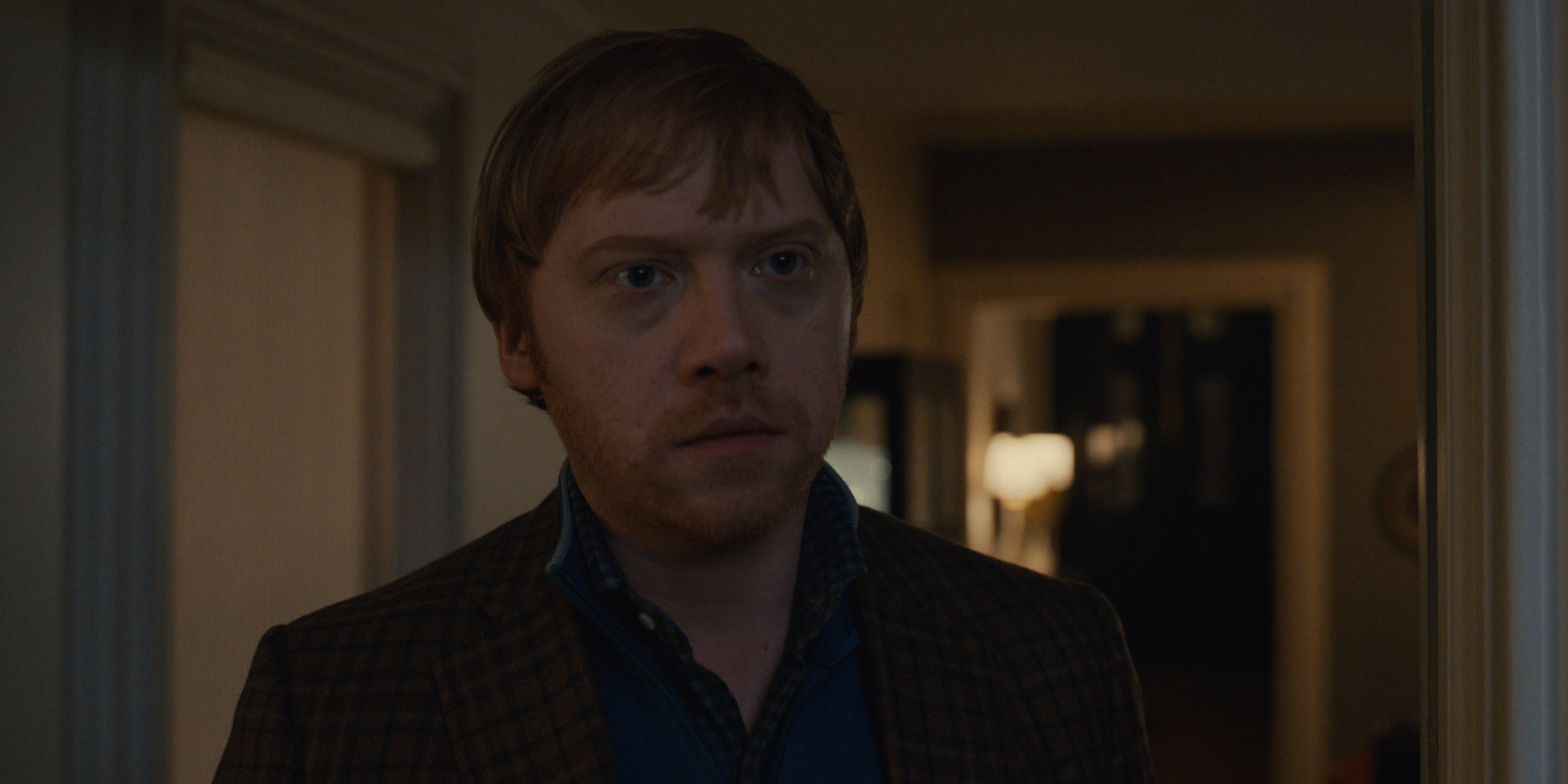
In both real life and the fictional world he inhabits onscreen, Rupert Grint’s life these days revolves around babies. The real-life one is his nine-month-old daughter Wednesday, who’s been keeping the former Harry Potter star busy—and delighting his Instagram followers—throughout lockdown. The fictional one is a creepy doll named Jericho, which Grint’s onscreen sister Dorothy (played by Lauren Ambrose) seems to believe is real, to unsettling effect, in director M. Night Shyamalan’s Apple TV+ thriller Servant. Grint’s character, Julian Pearce, helped introduce the doll to Dorothy, to help her recover from the death of her child. As in all things Shyamalan, all is not as it seems, and it’s hard to know who to trust—not even the actor best-known for portraying the lovable Ron Weasley. To mark the show’s second season, which is currently airing, Shyamalan spoke to Grint about parenthood, acting, and the perils of karaoke. —EVELINE CHAO
———
SHYAMALAN: So look, I’m excited, dude.
GRINT: And I.
SHYAMALAN: You’re so good. I never get to tell you because we’re always working, but I find you an anomaly as an actor. Of everybody I’ve directed and worked with, you are a unicorn. You’re just genuinely the most relaxed, easygoing, nicest guy, and yet, the precision of your craft is incredible. We’re going to try to figure this out in this interview.
GRINT: It comes up a lot with people I work with that I’m a mysterious creature. I just feel so in tune with Julian. Because there is a part of my personality that is quite cynical, that no one really gets to see.
SHYAMALAN: It’s really interesting that Julian is so cynical and you’re so at ease with it. I was just thinking this morning about when I first met you. I was 29 or something like that. Younger than you are now.
GRINT: I must’ve been 12 or 13. Jesus.
SHYAMALAN: And it’s such a weird feeling to, as adults now, work together. But I do think about your ease with the character. I don’t think there’s a bad take of you. I’m not just saying that. I’ve seen them all.
GRINT: That isn’t true.
SHYAMALAN: Do you remember where you were when you did your audition?
GRINT: It was at home. The pages I had didn’t really tell me anything about the story. It was a conversation between two guys who gave out a doll. I didn’t understand exactly what I was reading, but just from the dialogue, and the way and the rhythm in which he spoke, I felt very in tune and it felt very easy, more so than anything I’ve ever read.
SHYAMALAN: You would’ve thought it would be difficult for me to see you as an adult after seeing you as a child actor, but it wasn’t. It was such a spot-on audition. I was nervous about it. I’m like, “He can’t be this spot-on. He can’t.”
GRINT: And I’m so bad at tapes. It’s probably the only tape I’ve ever really felt good about.
SHYAMALAN: You’re kidding.
GRINT: Yeah. It’s really not my thing.
SHYAMALAN: You’re shocking me. We refer to you in the writers’ room as our secret weapon.
GRINT: No way. That’s ridiculous.
SHYAMALAN: Your flexibility, your agility to do comedy, drama, and physicality in every way. I have to attribute it to the amount of practice you had as a child.
GRINT: I guess. It was a real education, because it was such a long, intense period of time. We worked with so many great directors and people, and when it finished, it did feel like we were graduating from college, in a way.
SHYAMALAN: It didn’t even occur to me that you were growing up sparring with some of the great actors of our time.
GRINT: Absolutely. We were just soaking all that up.
SHYAMALAN: The way I like to shoot and the directors I like to hire for our show, I stress a theater approach where we do longer takes and don’t do a lot of coverage, and keep the energy and let you guys decide the tone as it’s moving. Have you had some theater training?
GRINT: Not really training, no. I mean, I’ve always done theater.
SHYAMALAN: That’s what I mean. I mean that you’ve been on the stage, right?
GRINT: Yeah, and I’ve done the West End. I’ve done a bit of Broadway and I do love it. It’s a different kind of craft. Servant kind of bridges the gap. It does feel like a lot of the scenes in Servant are very theatrical. The set is this intimate stage, so it feels very familiar.
SHYAMALAN: I love what you said, bridging the gap, because that’s exactly what my aesthetics are. Somewhere between film and the stage, that’s where I want the performances and the actors to be. When I was thinking of casting Lauren [Ambrose] as Dorothy, it was her theater training and experience on the stage that made me feel like she was going to flourish in this style of storytelling. And then I had this not-small challenge of finding who could be her brother; who could match her? As you know, Lauren is this volcano of energy and specificity.
GRINT: She really is.
SHYAMALAN: She never does anything she doesn’t believe in. She really commits. Who could bounce off that and wouldn’t get muted by her? When I saw you, I was like, “God, you two are perfect together as brother and sister. This is perfect.”
GRINT: Weirdly, I always thought that one day we might be in the same family, because of the red hair. I expect I’ll probably play opposite Lindsay Lohan one day. [Laughs] But [Lauren] is great. You really do feed off her energy.
SHYAMALAN: Yeah, you two just explode. And then the other thing that has emerged on the show, for me, is you’re so nimble that you bring out the best in your colleagues as well. They’re so at ease. When one of your colleagues is spinning out about something, your demeanor always centers them and you’re very patient. One of the things I didn’t expect to find when I was writing the show was this relationship between Sean and Julian, this kind of brother-in-law love. This bromance between the two of them, it’s great. The audience loves it and we write towards it because you guys are so fun together.
GRINT: I love those scenes.
SHYAMALAN: You can see it.
GRINT: Toby [Kebbell] is brilliant in his work. He’s really hilarious. It’s a feeling you need to kind of follow his rhythm. It’s like jazz in a way, when we’re riffing in these dark shadows. I really enjoy that.
SHYAMALAN: Your humor is very dry. When we hang out, you’re not busting jokes every five seconds. You’re very quiet. You’re just sitting there quietly and you’ll giggle.
GRINT: Well, if I’m doing karaoke, which I didn’t want to bring up…
SHYAMALAN: [Laughs] See, that’s a great example. We went out to a hip-hop karaoke place, as people are wont to do when they’ve had some drinks, and we get there and you’re forced to get onstage by Nell [Tiger Free] and then you just shut down.
GRINT: Yeah, I did.
SHYAMALAN: This is what I’m saying. When I put on the camera, and you’re performing, you’re like a neon sign; you go crazy. But in real life, you’re very quiet, even when we’re hanging out. You’re very shy. What’s that all about
GRINT: I’ve always been quite a shy guy. I think that’s what I love about drama and acting. The art of pretending to be somewhere else is always such a huge thrill for me. Usually with karaoke, or any kind of stage, I completely lose sight of any kind of shyness, but that night, I don’t know what happened. I didn’t really know the lyrics and I need to know what I’m rapping.
SHYAMALAN: I know we’re joking, but I’m actually feeling like something revelatory is happening as we’re talking about this karaoke night, because it was really poignant when you said that you’re really a shy guy. But when you get to play a character, you just unleash and you show all these sides of yourself. And then that night onstage, there was no character to play. You were being yourself. You didn’t even know the lyrics, so you couldn’t even find a character to be like, “Okay, I’m going to pretend I’m the character in this song.”
GRINT: Yeah.
SHYAMALAN: You were like, “What did Kanye West write? I don’t even remember what he wrote.” .
GRINT: It completely devolved. I had nothing.
SHYAMALAN: So maybe for the first time in your life you were on a stage with no character, just you, and you were super introverted.
GRINT: Wow. I haven’t gone that deep with it, but yeah.
SHYAMALAN: I was in the audience that night and my mouth was open when I was watching.
GRINT: Did you have any kind of instinct to come and save me?
SHYAMALAN: Well, I was being goaded to get on the stage with you.
GRINT: Oh, god.
SHYAMALAN: But I could foresee, being a man of plot, that the three of us were going to end up becoming a video that was going to get passed around, so I was like, “I’m going to let you two handle this up there.”
GRINT: That was probably very wise.
SHYAMALAN: We’re about to shoot the third season, and the second season is about to air. Over the quarantine, I’ve worked out the full story and where it wants to go. In my head it’s four seasons and I wonder what your feelings are about playing a character for four years and then having to say goodbye to it. I guess you had a similar experience with the Harry Potter series.
GRINT: It’s kind of my comfort zone. I love building a character and etching out all the nuance over a long period of time, and then saying goodbye to it. It’s why I love TV.
SHYAMALAN: When I say you’re a unicorn, this is what I mean: I can give you anything to do with Julian and you do it seemingly effortlessly. If I say, “You’re going to do this sex scene and you’re going to be emotional,” it’s easy. “You’re going to carry a body through the house.” “No problem.” “You’re going to be angry, you’re going to be drunk.” Whatever I tell you to do, you’re playing it so effortlessly. Yet, when I look in your eyes if you’re standing in the corner, I see a shy, introverted guy with the weight of the world on him, and I’m like, “Are you okay?” I don’t understand the two parts. How can you be so at ease and then so un-at-ease at the same time?
GRINT: I don’t know. I get what you’re saying. I think when I’m on set, it’s a whole cocktail of things going on in my brain. I have a lot of anxiety. I’m not a very self-confident person. I’m always second-guessing myself. I want to make sure I get everything landing on every possible thing. So yeah, it’s tense. I guess I’m not really relaxed in that way.
SHYAMALAN: When you’re in your apartment, before you’re shooting, or in the dressing room, or in your trailer, are you practicing? Looking in the mirror? Are you reading it to somebody else? How are you getting ready for it?
GRINT: I don’t really read it that much. I find if I read it too much, it becomes just words, like it doesn’t stay in my head. It’s all feeling, I guess. I don’t look in the mirror. I read a few times, and sometimes Georgia [Groome, Grint’s wife] will help me with a tricky bit, but I think just getting on set and then doing it is where I find it.
SHYAMALAN: You go more instinctual. You memorize it and then you let it come out.
GRINT: Yeah and usually in the first take, I know if I’m near. That’s always been my process. Except that with Julian, as I’ve said, he comes to me a lot easier than other characters have, so I don’t struggle over him so much. And the writing is great, which makes it so much easier.
SHYAMALAN: So you have a baby now. Do you think that will change how you pick projects? Are you going to bring the family wherever you go?
GRINT: Yeah, that’s my feeling at the moment. We’ll just go with the flow. It’s really changed me, in so many great ways. She ignited a really great routine and it’s helped everything. I’m crying literally, which is weird. I don’t know why I’m doing that.
SHYAMALAN: I found when I had a baby, that it was very centering. You hold the baby and you get very peaceful. I got addicted to carrying the baby around.
GRINT: Yeah, it’s great and it’s constantly changing. She’s become a different girl every month. It’s like a different child.
SHYAMALAN: Yeah, they change so fast. I can’t wait to meet the little one in person. Get her out of quarantine here so I can meet her.
GRINT: I know. I can’t wait to get back out there.

